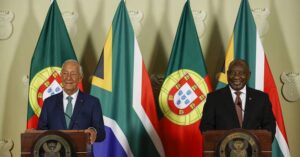Portugal’s President, Marcelo Rebelo de Sousa, delivered a poignant address on Tuesday, acknowledging his country’s culpability for crimes committed during the transatlantic slave trade and colonial era. In a stark admission of historical responsibility, President Sousa emphasized the imperative for Portugal to atone for past injustices through reparations.
“We have to pay the costs,” President Sousa asserted, underscoring the need for Portugal to confront its colonial legacy and seek restitution for the crimes committed. His remarks reflect a departure from mere apologies, signaling a shift towards tangible actions to address historical wrongs.
Last year, President Sousa’s call for action extended beyond verbal acknowledgment as he spoke at Portugal’s annual commemoration of the 1974 “Carnation” revolution, which heralded the end of the country’s dictatorial regime.
Also, read: Tanzania Shuts Down Five Hydroelectric Stations to Reduce Excess Electricity in the National Grid
The colonial empire of Portugal, spanning from the 15th to the 20th century, left an indelible mark on history, encompassing dominions in Africa and extending across continents from the Americas to Japan.
In a show of solidarity, Brazil’s Minister for Racial Equality has reached out to the Portuguese government, offering assistance in developing reparative measures. This collaboration underscores the interconnectedness of nations in addressing historical injustices and fostering reconciliation.
The recent addition of the UN human rights chief’s voice to the chorus of African and Caribbean countries calling for amends further amplifies the global demand for accountability over slavery and colonization.
Portugal’s acknowledgment of its colonial past and commitment to reparations represents a significant step towards healing historical wounds and promoting social justice on an international scale.
As Portugal grapples with its colonial legacy, the call for reparations resonates not only as a moral imperative but also as a crucial step towards fostering understanding, reconciliation, and a more equitable future.
President Sousa’s leadership in confronting the past offers hope for meaningful progress in addressing historical injustices and building a more inclusive society grounded in truth and accountability.

